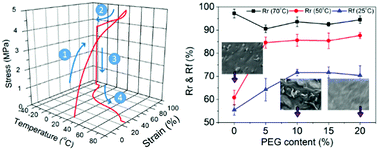当前位置:
X-MOL 学术
›
J. Mater. Chem. B
›
论文详情
Our official English website, www.x-mol.net, welcomes your feedback! (Note: you will need to create a separate account there.)
Toward the low actuation temperature of flexible shape memory polymer composites with room temperature deformability via induced plasticizing effect
Journal of Materials Chemistry B ( IF 7 ) Pub Date : 2017-10-14 00:00:00 , DOI: 10.1039/c7tb02068f Shenyang Cai 1, 2, 3, 4, 5 , Yu-Chen Sun 1, 2, 3, 4, 6 , Jie Ren 5, 7, 8, 9, 10 , Hani E. Naguib 1, 2, 3, 4, 6
Journal of Materials Chemistry B ( IF 7 ) Pub Date : 2017-10-14 00:00:00 , DOI: 10.1039/c7tb02068f Shenyang Cai 1, 2, 3, 4, 5 , Yu-Chen Sun 1, 2, 3, 4, 6 , Jie Ren 5, 7, 8, 9, 10 , Hani E. Naguib 1, 2, 3, 4, 6
Affiliation

|
Semi-crystalline/elastomer blends such as poly(lactic acid) (PLA) and thermoplastic polyurethane (TPU) have been well-studied as shape memory polymer (SMP) systems over the last decade. The SMP system is known to be reliable as the activation or transitional temperature (Ttrans) is well defined by its glass transition temperature (Tg). In this study, the possibility of altering SMPs’ Ttrans by introducing plasticizer molecules, such as poly(ethylene glycol) (PEG), into the system was investigated. Significant changes in morphologies and thermal behaviours of the composites after the incorporation of plasticizer inferring the possible changes in shape memory behaviours were reported. It was concluded that the SMP performance, in terms of activation temperature, shape fixing (Rf), shape recovery (Rr) ratio, and recovery time, could be improved significantly due to the induced plasticizing effects. With only the incorporation of 5 wt% PEG, the Ttrans of PLA/TPU SMP was successfully decreased from the well-known 75 °C to 50 °C while achieving 85% Rr ratio. An improvement in 37.5% shorter recovery time can be observed with the incorporation of 10 wt% PEG when compared with a pristine PLA/TPU system under 50 °C. The results indicated that plasticizing is an effective method for altering the polymer chain structures and a step closer toward the development of fast response SMPs that can be activated under a low temperature.
中文翻译:

通过诱导塑化作用,使具有室温变形能力的柔性形状记忆聚合物复合材料的致动温度低
在过去的十年中,半结晶/弹性体共混物(例如聚乳酸(PLA)和热塑性聚氨酯(TPU))已被广泛研究为形状记忆聚合物(SMP)系统。众所周知,SMP系统是可靠的,因为其玻璃化转变温度(T g)可以很好地定义活化温度或转变温度(T trans)。在这项研究中,改变SMP的T反式的可能性通过将增塑剂分子(例如聚(乙二醇)(PEG))引入系统进行了研究。据报道,在掺入增塑剂后,复合材料的形貌和热行为发生了显着变化,从而推断出形状记忆行为可能发生了变化。结论是,由于诱导的塑化作用,在活化温度,形状固定(R f),形状恢复(R r)比率和恢复时间方面的SMP性能可以得到显着改善。仅加入5 wt%的PEG,PLA / TPU SMP的T反式就成功地从众所周知的75°C降至50°C,同时实现了85%的R r比率。与原始PLA / TPU系统在50°C下相比,掺入10 wt%PEG可以观察到恢复时间缩短了37.5%。结果表明,塑化是改变聚合物链结构的有效方法,是朝着开发可在低温下活化的快速响应SMP迈进的一步。
更新日期:2017-11-15
中文翻译:

通过诱导塑化作用,使具有室温变形能力的柔性形状记忆聚合物复合材料的致动温度低
在过去的十年中,半结晶/弹性体共混物(例如聚乳酸(PLA)和热塑性聚氨酯(TPU))已被广泛研究为形状记忆聚合物(SMP)系统。众所周知,SMP系统是可靠的,因为其玻璃化转变温度(T g)可以很好地定义活化温度或转变温度(T trans)。在这项研究中,改变SMP的T反式的可能性通过将增塑剂分子(例如聚(乙二醇)(PEG))引入系统进行了研究。据报道,在掺入增塑剂后,复合材料的形貌和热行为发生了显着变化,从而推断出形状记忆行为可能发生了变化。结论是,由于诱导的塑化作用,在活化温度,形状固定(R f),形状恢复(R r)比率和恢复时间方面的SMP性能可以得到显着改善。仅加入5 wt%的PEG,PLA / TPU SMP的T反式就成功地从众所周知的75°C降至50°C,同时实现了85%的R r比率。与原始PLA / TPU系统在50°C下相比,掺入10 wt%PEG可以观察到恢复时间缩短了37.5%。结果表明,塑化是改变聚合物链结构的有效方法,是朝着开发可在低温下活化的快速响应SMP迈进的一步。

























 京公网安备 11010802027423号
京公网安备 11010802027423号